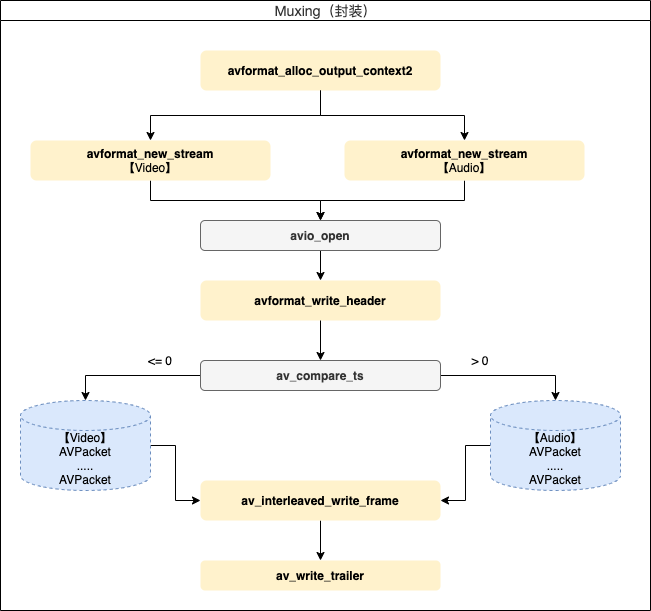本文主要参考雷神的最简单的基于FFmpeg的封装格式处理:视音频复用器(muxer) 与官方例子doc/examples/muxing.c 。
FFmpeg解封装流程

其中,AVFormatContext、AVPacket等重要的结构体请看:FFmpeg重要结构体(转自雷神) 。
以上步骤主要方法的简单说明。
(1)avformat_alloc_output_context2
构造输出的AVFormatContext。
(2)avformat_new_stream
将新的流添加到AVFormatContext中。
(3)avformat_write_header
写入文件头
(4)av_interleaved_write_frame
通过解封装文件(或者创建)得到的AVPacket数据写入到文件中。
(5)av_write_trailer
写入文件尾
代码实现
#include <stdio.h>
#define __STDC_CONSTANT_MACROS
#ifdef _WIN32
//Windows
extern "C"
{
#include "libavformat/avformat.h"
};
#else
//Linux...
#ifdef __cplusplus
extern "C"
{
#endif
#include <libavformat/avformat.h>
#ifdef __cplusplus
};
#endif
#endif
/*
FIX: H.264 in some container format (FLV, MP4, MKV etc.) need
"h264_mp4toannexb" bitstream filter (BSF)
*Add SPS,PPS in front of IDR frame
*Add start code ("0,0,0,1") in front of NALU
H.264 in some container (MPEG2TS) don't need this BSF.
*/
//'1': Use H.264 Bitstream Filter
#define USE_H264BSF 0
/*
FIX:AAC in some container format (FLV, MP4, MKV etc.) need
"aac_adtstoasc" bitstream filter (BSF)
*/
//'1': Use AAC Bitstream Filter
#define USE_AACBSF 0
int main(int argc, char *argv[]) {
AVOutputFormat *ofmt = NULL;
//Input AVFormatContext and Output AVFormatContext
AVFormatContext *ifmt_ctx_v = NULL, *ifmt_ctx_a = NULL, *ofmt_ctx = NULL;
AVPacket pkt;
int ret, i;
int videoindex_v = -1, videoindex_out = -1;
int audioindex_a = -1, audioindex_out = -1;
int frame_index = 0;
int64_t cur_pts_v = 0, cur_pts_a = 0;
int writing_v = 1, writing_a = 1;
const char *in_filename_v = "source/kobe.h264";
const char *in_filename_a = "source/kobe.aac";
const char *out_filename = "output/kobe.flv";//Output file URL
remove(out_filename);
//Input
if ((ret = avformat_open_input(&ifmt_ctx_v, in_filename_v, 0, 0)) < 0) {
printf("Could not open input file.");
goto end;
}
if ((ret = avformat_find_stream_info(ifmt_ctx_v, 0)) < 0) {
printf("Failed to retrieve input stream information");
goto end;
}
if ((ret = avformat_open_input(&ifmt_ctx_a, in_filename_a, 0, 0)) < 0) {
printf("Could not open input file.");
goto end;
}
if ((ret = avformat_find_stream_info(ifmt_ctx_a, 0)) < 0) {
printf("Failed to retrieve input stream information");
goto end;
}
//Output
avformat_alloc_output_context2(&ofmt_ctx, NULL, NULL, out_filename);
if (!ofmt_ctx) {
printf("Could not create output context\n");
ret = AVERROR_UNKNOWN;
goto end;
}
ofmt = ofmt_ctx->oformat;
for (i = 0; i < ifmt_ctx_v->nb_streams; i++) {
//Create output AVStream according to input AVStream
if (ifmt_ctx_v->streams[i]->codec->codec_type == AVMEDIA_TYPE_VIDEO) {
AVStream *out_stream = avformat_new_stream(ofmt_ctx, ifmt_ctx_v->streams[i]->codec->codec);
videoindex_v = i;
if (!out_stream) {
printf("Failed allocating output stream\n");
ret = AVERROR_UNKNOWN;
goto end;
}
videoindex_out = out_stream->index;
//Copy the settings of AVCodecContext
if (avcodec_copy_context(out_stream->codec, ifmt_ctx_v->streams[i]->codec) < 0) {
printf("Failed to copy context from input to output stream codec context\n");
goto end;
}
out_stream->codec->codec_tag = 0;
if (ofmt_ctx->oformat->flags & AVFMT_GLOBALHEADER)
out_stream->codec->flags |= AV_CODEC_FLAG_GLOBAL_HEADER;
break;
}
}
for (i = 0; i < ifmt_ctx_a->nb_streams; i++) {
//Create output AVStream according to input AVStream
if (ifmt_ctx_a->streams[i]->codec->codec_type == AVMEDIA_TYPE_AUDIO) {
AVStream *out_stream = avformat_new_stream(ofmt_ctx, ifmt_ctx_a->streams[i]->codec->codec);
audioindex_a = i;
if (!out_stream) {
printf("Failed allocating output stream\n");
ret = AVERROR_UNKNOWN;
goto end;
}
audioindex_out = out_stream->index;
//Copy the settings of AVCodecContext
if (avcodec_copy_context(out_stream->codec, ifmt_ctx_a->streams[i]->codec) < 0) {
printf("Failed to copy context from input to output stream codec context\n");
goto end;
}
out_stream->codec->codec_tag = 0;
if (ofmt_ctx->oformat->flags & AVFMT_GLOBALHEADER)
out_stream->codec->flags |= AV_CODEC_FLAG_GLOBAL_HEADER;
break;
}
}
/* open the output file, if needed */
if (!(ofmt->flags & AVFMT_NOFILE)) {
if (avio_open(&ofmt_ctx->pb, out_filename, AVIO_FLAG_WRITE)) {
fprintf(stderr, "Could not open '%s': %s\n", out_filename,
av_err2str(ret));
goto end;
}
}
//Write file header
if (avformat_write_header(ofmt_ctx, NULL) < 0) {
fprintf(stderr, "Error occurred when opening output file: %s\n",
av_err2str(ret));
goto end;
}
while (writing_v || writing_a) {
AVFormatContext *ifmt_ctx;
int stream_index = 0;
AVStream *in_stream, *out_stream;
if (writing_v && (!writing_a || av_compare_ts(cur_pts_v, ifmt_ctx_v->streams[videoindex_v]->time_base,
cur_pts_a, ifmt_ctx_a->streams[audioindex_a]->time_base) <= 0)) {
ifmt_ctx = ifmt_ctx_v;
stream_index = videoindex_out;
if (av_read_frame(ifmt_ctx, &pkt) >= 0) {
do {
in_stream = ifmt_ctx->streams[pkt.stream_index];
out_stream = ofmt_ctx->streams[stream_index];
if (pkt.stream_index == videoindex_v) {
//FIX:No PTS (Example: Raw H.264)
//Simple Write PTS
if (pkt.pts == AV_NOPTS_VALUE) {
//Write PTS
AVRational time_base1 = in_stream->time_base;
//Duration between 2 frames (us)
int64_t calc_duration = (double) AV_TIME_BASE / av_q2d(in_stream->r_frame_rate);
//Parameters
pkt.pts = (double) (frame_index * calc_duration) /
(double) (av_q2d(time_base1) * AV_TIME_BASE);
pkt.dts = pkt.pts;
pkt.duration = (double) calc_duration / (double) (av_q2d(time_base1) * AV_TIME_BASE);
frame_index++;
}
cur_pts_v = pkt.pts;
break;
}
} while (av_read_frame(ifmt_ctx, &pkt) >= 0);
} else {
writing_v = 0;
continue;
}
} else {
ifmt_ctx = ifmt_ctx_a;
stream_index = audioindex_out;
if (av_read_frame(ifmt_ctx, &pkt) >= 0) {
do {
in_stream = ifmt_ctx->streams[pkt.stream_index];
out_stream = ofmt_ctx->streams[stream_index];
if (pkt.stream_index == audioindex_a) {
//FIX:No PTS
//Simple Write PTS
if (pkt.pts == AV_NOPTS_VALUE) {
//Write PTS
AVRational time_base1 = in_stream->time_base;
//Duration between 2 frames (us)
int64_t calc_duration = (double) AV_TIME_BASE / av_q2d(in_stream->r_frame_rate);
//Parameters
pkt.pts = (double) (frame_index * calc_duration) /
(double) (av_q2d(time_base1) * AV_TIME_BASE);
pkt.dts = pkt.pts;
pkt.duration = (double) calc_duration / (double) (av_q2d(time_base1) * AV_TIME_BASE);
frame_index++;
}
cur_pts_a = pkt.pts;
break;
}
} while (av_read_frame(ifmt_ctx, &pkt) >= 0);
} else {
writing_a = 0;
continue;
}
}
//Convert PTS/DTS
pkt.pts = av_rescale_q_rnd(pkt.pts, in_stream->time_base, out_stream->time_base,
(AVRounding) (AV_ROUND_NEAR_INF | AV_ROUND_PASS_MINMAX));
pkt.dts = av_rescale_q_rnd(pkt.dts, in_stream->time_base, out_stream->time_base,
(AVRounding) (AV_ROUND_NEAR_INF | AV_ROUND_PASS_MINMAX));
pkt.duration = av_rescale_q(pkt.duration, in_stream->time_base, out_stream->time_base);
pkt.pos = -1;
pkt.stream_index = stream_index;
printf("Write 1 Packet. size:%5d\tpts:%lld\n", pkt.size, pkt.pts);
//Write
if (av_interleaved_write_frame(ofmt_ctx, &pkt) < 0) {
printf("Error muxing packet\n");
break;
}
av_free_packet(&pkt);
}
printf("Write file trailer.\n");
//Write file trailer
av_write_trailer(ofmt_ctx);
end:
avformat_close_input(&ifmt_ctx_v);
avformat_close_input(&ifmt_ctx_a);
/* close output */
if (ofmt_ctx && !(ofmt->flags & AVFMT_NOFILE))
avio_close(ofmt_ctx->pb);
avformat_free_context(ofmt_ctx);
if (ret < 0 && ret != AVERROR_EOF) {
printf("Error occurred.\n");
return -1;
}
return 0;
}膜拜大佬:大佬原文





















 1008
1008











 被折叠的 条评论
为什么被折叠?
被折叠的 条评论
为什么被折叠?








